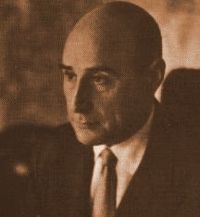Difference between revisions of "Marcello Mathias"
(dates, desc) |
(unstub) |
||
| Line 1: | Line 1: | ||
{{person | {{person | ||
| − | |wikipedia=https:// | + | |wikipedia=https://en.wikipedia.org/wiki/Marcelo_Duarte_Matias |
| − | |description=Portuguese diplomat | + | |description=[[Estado Novo]] Portuguese diplomat and colonial administrator who attended [[Bilderberg/1962]] and [[Bilderberg/1963]]. |
|image=Marcello Mathias.jpg | |image=Marcello Mathias.jpg | ||
|nationality=Portuguese | |nationality=Portuguese | ||
| + | |siblings=Mário Mathias | ||
| + | |children=Leonardo Duarte Mathias, Marcello Duarte Mathias | ||
| + | |interests=Calouste Gulbenkian Foundation | ||
| + | |alma_mater=University of Lisbon | ||
|birth_date=15 August 1903 | |birth_date=15 August 1903 | ||
| − | |birth_place= | + | |birth_place=Lisbon, Portugal |
|death_date=9 June 1999 | |death_date=9 June 1999 | ||
| − | |death_place= | + | |death_place= Cascais, Estoril,Portugal |
|constitutes=diplomat, writer, politician | |constitutes=diplomat, writer, politician | ||
| − | |employment= | + | |employment={{job |
| + | |title=Portugal/Minister/Foreign Affairs | ||
| + | |start=1958 | ||
| + | |end=1961 | ||
| + | |description=Attended [[Bilderberg/1962]] and [[Bilderberg/1963]]. | ||
| + | }}{{job | ||
| + | |title=Portugal/Ambassador/France | ||
| + | |start=1948 | ||
| + | |end=1958 | ||
| + | |description=Attended [[Bilderberg/1962]] and [[Bilderberg/1963]]. | ||
}} | }} | ||
| + | }} | ||
| + | '''Marcello Gonçalves Nunes Duarte Mathias''' was a Portuguese diplomat, colonial administrator and writer at the time of the [[Estado Novo]].<ref>https://memoriaoraldiplomacia.mne.gov.pt/en/interviews/marcello-mathias-en</ref> He attended the [[Bilderberg/1962|1962]] and [[Bilderberg/1963|1963]] Bilderberg meetings. | ||
| + | |||
| + | ==Education== | ||
| + | He studied and graduated with a degree in law from the Faculty of Law of the [[University of Lisbon]]<ref>''Quem é Alguém''. Lisboa: Portugália Editora, L.da. 1947. 451</ref>. | ||
| + | |||
| + | ==Career== | ||
| + | He joined the diplomatic service in [[1930]], and became Secretary of Legation to the Consulate-General in [[Rio de Janeiro]] in [[1931]]. He managed the Consulate-General from 1932 to 1934, and that of [[Athens]] from [[1934]] to [[1935]]. He became deputy consul to the Consulate-General in [[Paris]] in [[1934]], Secretary of Legation at the Embassy of Portugal in [[London]] in [[1935]] and head of the cipher section in [[1939]], and Secretary of Legation at the Embassy of Rio de [[Janeiro]] in [[1940]]. | ||
| + | |||
| + | He became Director General of Political Affairs and internal administration of the Ministry of Foreign Affairs, and then [[Portugal/Minister/Foreign Affairs|Minister of Foreign Affairs]] between 29 September 1958 and 1961.<ref>Costados, D. Gonçalo de Mesquita da Silveira de Vasconcelos e Sousa, ''Livraria Esquina'', 1.ª Edição, Porto, 1997, N.º 73</ref><ref>Anuário da Nobreza de Portugal - 1985", Direção de Manuel de Mello Corrêa, Instituto Português de Heráldica, 1.ª Edição, Lisboa, 1985, Tomo I, p. 521</ref> | ||
| + | |||
| + | He was ambassador of [[Portugal/Ambassador/France|Portugal in Paris]], during which he convinced the billionaire [[Calouste Gulbenkian]] to establish his fortune in [[Portugal]] and create a foundation there, the [[Calouste Gulbenkian Foundation]].{{CN}} | ||
| + | |||
{{SMWDocs}} | {{SMWDocs}} | ||
==References== | ==References== | ||
{{reflist}} | {{reflist}} | ||
| − | |||
Revision as of 07:19, 11 December 2023
(diplomat, writer, politician) | |||||||||||||||||||||
|---|---|---|---|---|---|---|---|---|---|---|---|---|---|---|---|---|---|---|---|---|---|
 | |||||||||||||||||||||
| Born | 15 August 1903 Lisbon, Portugal | ||||||||||||||||||||
| Died | 9 June 1999 (Age 95) Cascais, Estoril, Portugal | ||||||||||||||||||||
| Nationality | Portuguese | ||||||||||||||||||||
| Alma mater | University of Lisbon | ||||||||||||||||||||
| Children | • Leonardo Duarte Mathias • Marcello Duarte Mathias | ||||||||||||||||||||
| Siblings | Mário Mathias | ||||||||||||||||||||
| Interests | Calouste Gulbenkian Foundation | ||||||||||||||||||||
Estado Novo Portuguese diplomat and colonial administrator who attended Bilderberg/1962 and Bilderberg/1963.
| |||||||||||||||||||||
Marcello Gonçalves Nunes Duarte Mathias was a Portuguese diplomat, colonial administrator and writer at the time of the Estado Novo.[1] He attended the 1962 and 1963 Bilderberg meetings.
Education
He studied and graduated with a degree in law from the Faculty of Law of the University of Lisbon[2].
Career
He joined the diplomatic service in 1930, and became Secretary of Legation to the Consulate-General in Rio de Janeiro in 1931. He managed the Consulate-General from 1932 to 1934, and that of Athens from 1934 to 1935. He became deputy consul to the Consulate-General in Paris in 1934, Secretary of Legation at the Embassy of Portugal in London in 1935 and head of the cipher section in 1939, and Secretary of Legation at the Embassy of Rio de Janeiro in 1940.
He became Director General of Political Affairs and internal administration of the Ministry of Foreign Affairs, and then Minister of Foreign Affairs between 29 September 1958 and 1961.[3][4]
He was ambassador of Portugal in Paris, during which he convinced the billionaire Calouste Gulbenkian to establish his fortune in Portugal and create a foundation there, the Calouste Gulbenkian Foundation. [Citation Needed]
Events Participated in
| Event | Start | End | Location(s) | Description |
|---|---|---|---|---|
| Bilderberg/1962 | 18 May 1962 | 20 May 1962 | Sweden Saltsjöbaden | The 11th Bilderberg meeting and the first one in Sweden. |
| Bilderberg/1963 | 29 March 1963 | 31 March 1963 | France Cannes Hotel Martinez | The 12th Bilderberg meeting and the second one in France. |
References
- ↑ https://memoriaoraldiplomacia.mne.gov.pt/en/interviews/marcello-mathias-en
- ↑ Quem é Alguém. Lisboa: Portugália Editora, L.da. 1947. 451
- ↑ Costados, D. Gonçalo de Mesquita da Silveira de Vasconcelos e Sousa, Livraria Esquina, 1.ª Edição, Porto, 1997, N.º 73
- ↑ Anuário da Nobreza de Portugal - 1985", Direção de Manuel de Mello Corrêa, Instituto Português de Heráldica, 1.ª Edição, Lisboa, 1985, Tomo I, p. 521